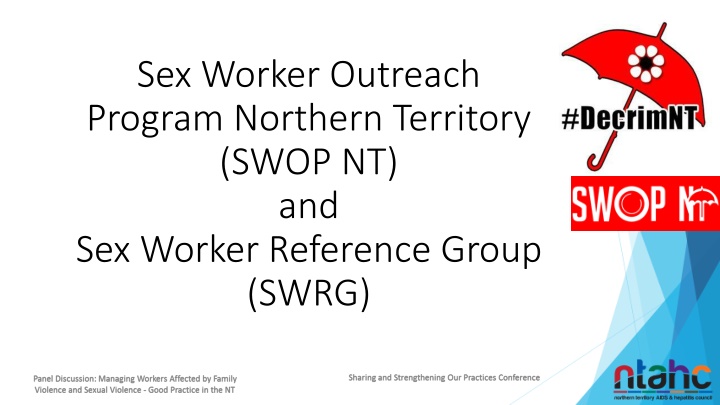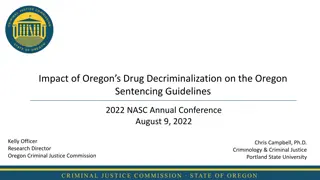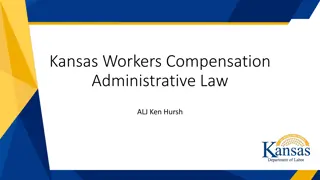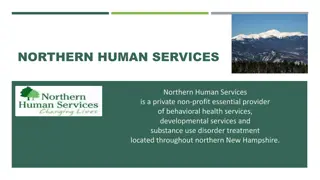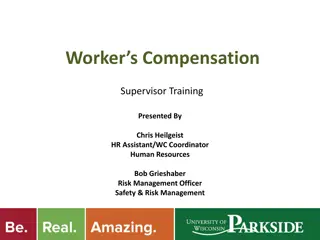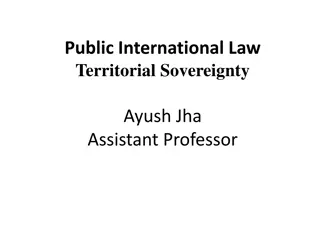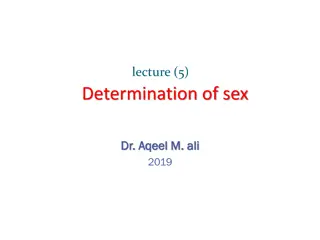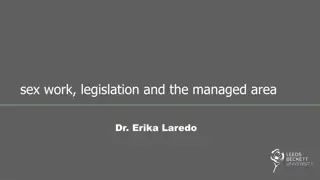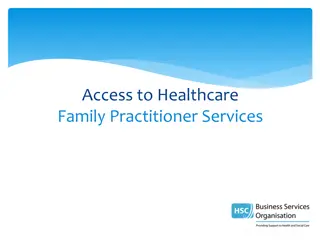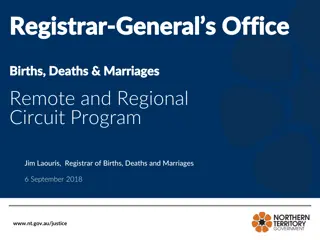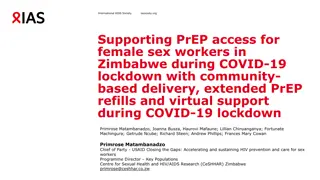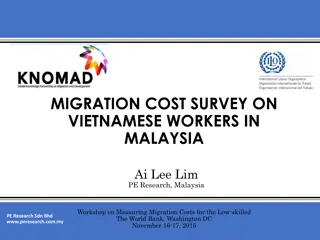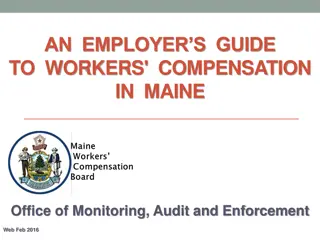Support and Decriminalization Efforts for Sex Workers in Northern Territory
The Sex Worker Outreach Program Northern Territory (SWOP NT) and Sex Worker Reference Group (SWRG) collaborate to advocate for the rights and safety of sex workers in Northern Territory. Through joint efforts and partnerships with stakeholders, they aim to decriminalize sex work, improve workplace environments, and ensure Workplace Health and Safety (WHS) and Anti-Discrimination protections. Their submission to modernize the Anti-Discrimination Act highlights the need for legal frameworks to protect sex workers from discrimination. The motion passed by the NT Labor conference in 2018 underlines the commitment to consult with sex workers and their organizations to enhance human rights and safety in the industry.
Download Presentation

Please find below an Image/Link to download the presentation.
The content on the website is provided AS IS for your information and personal use only. It may not be sold, licensed, or shared on other websites without obtaining consent from the author.If you encounter any issues during the download, it is possible that the publisher has removed the file from their server.
You are allowed to download the files provided on this website for personal or commercial use, subject to the condition that they are used lawfully. All files are the property of their respective owners.
The content on the website is provided AS IS for your information and personal use only. It may not be sold, licensed, or shared on other websites without obtaining consent from the author.
E N D
Presentation Transcript
Sex Worker Outreach Program Northern Territory (SWOP NT) and Sex Worker Reference Group (SWRG)
The Sex Worker Reference Group (SWRG) Established 2003 Is comprised of past and current sex workers who work in NT Co-represents alongside SWOP NT at roundtable and departmental and political meetings, and in delivery of training to stakeholders, conferences and forums. Documents best practice and case studies to support our joint recommendations and evidence for reforms Develops submissions based on the lived experience of workers
Motion passed by NT Labor conference 2018 To support safer working choices and workplace environments for sex workers who work in the Northern Territory. The NT Labor Government will continue to consult with sex workers, their organisations and national Association to decriminalise sex work by: abolishing the draconian Northern Territory Prostitution Regulation Act to allow for workers and business to comply with existing NT business regulations; developing WH&S guidelines and amending the Anti-Discrimination Act to ensure sex workers are protected by WH&S legislation, and anti-discrimination laws; and implementing a Human Rights Charter that provides human rights protections for sex workers.
Workplace Health and Safety WHS & Anti-Discrimination Protections
Anti Discrimination Protections: Ensuring sex workers are protected by anti protected by anti- -discrimination laws discrimination laws Scarlet Alliance, SWOP NT and SWRG submitted recommendations and case studies to the review to modernise the Northern Territory Anti- Discrimination Act Ensuring sex workers are SWOP NT & SWRG submission is supported by many NT stakeholders SWOP NT presented to the roundtable discussion on the modernisation of the Anti-Discrimination Act. A briefing paper was prepared by SWOP NT and SWRG with technical assistance from Scarlet Alliance to inform stakeholders We recommended that sex work and sex worker be included as main attributes and protection against vilification
Ending Violence Against Sex Workers is also about ending Ending Violence Against Sex Workers is also about ending social stigma discrimination and social stigma discrimination and criminalisation criminalisation Hate crimes are committed against sex workers in the Northern Territory Social stigma and discrimination contributes to the violence. Violence is perpetuated by stigma and discrimination as a consequence of the criminalisation of sex work and the policing and harassment of sex workers. Criminalisation and police regulation creates barriers to sex workers seeking to access support or justice when violence is experienced and sends a message to perpetrators that sex workers can be targeted with impunity and without consequence. These impacts of stigma and discrimination and violence are disproportionally felt by sex workers who are transwomen, Aboriginal and or Torres Strait Islander sex workers and other sex workers of colour, street based sex workers, workers who use alcohol and or other drugs, and migrant sex workers.
The stigma of sex work comes with a high cost The stigma of sex work comes with a high cost Systemic discrimination access to basic needs, goods and services, housing and accommodation, employment opportunities and justice Legally complicit Criminal and licensing laws create opportunities for violence where sex workers have to choose between safety and legality Perpetrators of sexual violence against sex workers know that stigma, discrimination and criminality minimise reporting Knowledge of someone s past or current sex work can be used against them by abusive partners, as blackmail or suggesting they are unfit parents in custody cases
Stigma Reduction Stigma Reduction listening to sex workers listening to sex workers Reducing stigma requires not only legal and policy change, but cultural change We together must support; The full Decriminalise sex work Anti-discrimination and work health safety protections Additional funding for peer driven rights based sex worker services Emotional Costs of Stigma External and internalised stigma impacts the mental health and emotional resilience of past & current sex workers ability to engage in advocacy. It is not uncommon for sex workers past and current to only disclose to each other
Barriers for sex workers accessing health services BBV/STI/Strategies - 2018-22 Stigma and discrimination Criminalisation Licensing Registration Mandatory testing Racism Incarceration lack of appropriately targeted services.
A best practice approach to law reform for the full A best practice approach to law reform for the full decriminalisation of sex work and anti decriminalisation of sex work and anti- - discrimination protections should be led by sex discrimination protections should be led by sex workers, in partnership with unions and workers, in partnership with unions and government. government. To achieve this it requires meaningful and active To achieve this it requires meaningful and active consultation with us, as sex workers, our consultation with us, as sex workers, our organisations and our national association, organisations and our national association, Scarlet Alliance, Australian Sex Workers Association. Scarlet Alliance, Australian Sex Workers Association.
Law reform for and with sex workers Law reform for and with sex workers Stakeholders must not be fearful of achieving reforms that sex workers want and deserve. Participation from all key stakeholders is required to attain safety for sex work industry workers and no less than the full decriminalisation full decriminalisation of sex work alongside Anti Anti- -Discrimination Discrimination and WHS protections WHS protections Sex work is work, sex work reforms = safer work Sex work is work, sex work reforms = safer work
